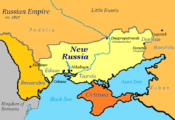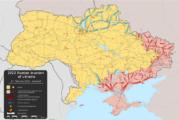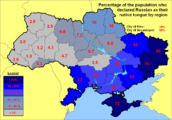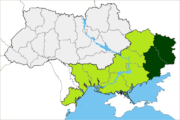Russia’s war effort took a massive blow when Russian President Vladimir Putin ordered his troops to withdraw from the suburbs of Kyiv and large swathes of northern Ukraine.
Russian gains have been reduced to a strip of land in southern Ukraine connecting the Crimea to Russia and a northeastern pocket adjacent to the Donbass region, which has been under de facto Russian control since Kremlin-backed separatists began a war of independence against Ukraine in 2014.
The humiliating retreat from the gates of the Ukrainian capital ended any hope for a quick Russian victory in Ukraine, and now Western intelligence experts anticipate that Russia is consolidating its forces for a renewed offensive in the south and the Donbass.
Russia failed miserably to conquer Ukraine in one fell swoop, and Ukrainian resistance, bolstered by Western equipment, continues to stiffen. So, what could Russia’s end goal possibly be?
Russia’s grievous losses in men and material to just secure the border regions most likely precludes an all-out annexation of the whole country, but Russia doesn’t need to do that to achieve its stated war aims.
Russia appears to be pivoting away from total conquest toward reclaiming an old region of the Russian Empire that holds a significant place in the country’s cultural identity: New Russia.
This map shows what may be Russia’s new end goal in the war:

Dim Grits, CC BY-SA 3.0 , via Wikimedia Commons
New Russia, Novorossiya in Russian, refers to lands in what is today southern Ukraine that were conquered by the Russian Empire in the late 18th century. The lands had previously been controlled by the Ottoman Empire, Russia’s arch-rival, and their client states. The Russians saw the conquest of these lands as vitally important so that Russia could get a warm water port in the Black Sea, crucial to trade with the West, and push the border with the Muslim Ottomans away from the Russian heartland.
During the reign of Catherine the Great, Russian settlers colonized the area, and new cities were founded to cement Russian rule there. Several of those towns, such as Mariupol and Kherson, have seen brutal fighting during Russia’s most recent invasion. The Donbass, which made up the eastern portion of New Russia, became a major industrial center for the Russian Empire and beyond. Soviet propaganda referred to the Donbass as the “heart of Russia” in the 1920s.
Despite defeat in the north, the Russian military has found far more success in southern Ukraine, taking much of the territory that once made up New Russia.
This map shows the current military situation in Ukraine:

2022_Russian_invasion_of_Ukraine.svg
Viewsridge, CC BY-SA 4.0 <https://creativecommons.org/licenses/by-sa/4.0>, via Wikimedia Commons
There are several reasons why Putin may be planning on just the reconquest of New Russia rather than attempting to fully subjugate Ukraine.
First, it’s an objective the Russian military can actually accomplish. Most of New Russia is already occupied; only the western area around the strategic port city of Odessa and a chunk of territory west of the Donbass remain.
Second, it fulfills Russia’s strategic interests. An autonomous or semi-autonomous New Russia would give the Kremlin a new puppet state and would serve as a useful buffer state between Russia and the West — just as it served as a buffer zone against the Ottomans. It would also provide a land corridor to the Crimea, which functions as an extremely important naval base in the Black Sea.
Finally, it satisfies one of Russia’s stated reasons for the invasion and plays into Putin’s propaganda spin of the war. Putin claimed that the Russian invasion would stop the “genocide” and oppression of Russian-speaking people in Ukraine. Russian is the native language of almost 30% of Ukraine’s population, and they are heavily concentrated in the eastern and southern parts of the country.
In fact, the vast majority of Russian speakers in Ukraine live in what used to be New Russia, as illustrated by this map:

via Wikimedia Commons
So, taking those lands would fulfill Putin’s promise to protect Russian speakers, and would allow them to create their own state.
The separatists in the Donetsk People’s Republic and the Luhansk People’s Republic, where upwards of 70% of the population speaks Russian, have made it clear that they intend to reestablish New Russia as a political entity. After the initial secession in early 2014, the separatist leaders proclaimed the founding of the Federal State of New Russia, a confederation comprising the regions where Russian is the majority language or represents a significant minority.
The new country would have included these territories:

The proposed state bears quite the resemblance to the historical New Russia and the current front line in the war. The proposed union was dropped in 2015 as the war with the Ukrainian government dragged on, but it could serve as a blueprint for the current conflict.
The Federal State of New Russia could be created through a formal peace process or by an informal ceasefire. If Russia occupies the territory and holds it against Ukrainian counterattacks, Ukraine may be forced to recognize de facto Russian control over the land while still claiming that it is legally part of Ukraine.
From there, it might remain an independent country, albeit heavily influenced by Russia just like Belarus, or it could be incorporated into the Russian Federation.
Most Russians are acutely aware of their history and how far they have fallen from the glory days of the Russian Empire or even the Soviet Union. Reconquering a province that has historically been regarded as an integral part of the empire and occupies a significant place in Russia’s national imagination would go a long way with rehabilitating Putin’s image after the botched initial invasion and further cementing his image as the leader who will return Russia to its historical glory.
As Russian troops redeploy to the southern and eastern parts of Ukraine, the Russian leadership will have to make a decision — double down on their failed attempt to seize all of Ukraine or attempt to recover a region that is steeped in Russian history and fulfills all of Russia’s war aims. The latter option would certainly cost fewer Russian lives and could be acceptable terms in a peace treaty, while the former option all but guarantees a longer and more destructive war — one that, at best, would give Russia a pyrrhic victory.
Hayden Daniel is the opinion editor at the Daily Caller.


